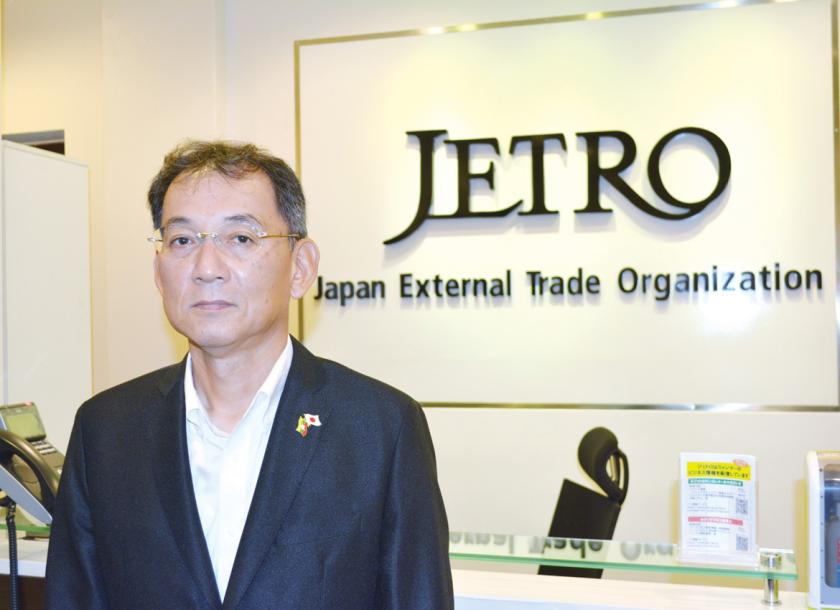Why Myanmar is important to Japan
Hirokazu Yamaoka, managing director of the Japan External Trade Organisation (JETRO), which is a Japanese governmental organisation under the Ministry of Economy, Trade and Industry, recently met with The Myanmar Times to discuss Japan’s plans in Myanmar.
Here’s an excerpt of that interview at JETRO’s office on U Wisara Road:
The Myanmar Times: Myanmar and Vietnam were once on level playing fields back in the 1990’s. Now, Vietnam’s economy is much more developed than Myanmar’s. What lessons can we learn from Vietnam?
Mr Yamaoka: In the 1990’s Vietnam prioritised developing economic relationships with foreign countries. It joined the World Trade Organisation and introduced robust policies inviting FDI and technology from abroad. It also invested in power generation. Now, Vietnam generates ten times more power than Myanmar and its exports are 14 times more than Myanmar.
Importantly, 60 percent of Vietnam’s exports are from manufacturing and mainly consist of value-added finished products such as Samsung smart phones. Because foreign companies like Samsung have a large presence in Vietnam, the country has the ability to manufacture high-value products and as a result, the value of Vietnam’s exports are now also double that of Myanmar’s.
Myanmar’s exports, on the other hand, mainly consist of raw materials such as natural gas and pulses and beans that are easily impacted by volatile prices. Manufacturing exports make up just 6pc-7pc of total exports. Myanmar must invest more in developing its manufacturing sector because it much easier to add value to manufactured products than to gas, crops or fish.
So why is Japan interested in Myanmar?
Myanmar’s edge is its workforce. Vietnam is getting very expensive because they are exporting items worth US$500 each after they succeeded in bringing in foreign technology to help them assemble and add value to finished goods. Ten years ago, Vietnam exported products worth just US$50 per item. This is a good example of what Myanmar can become.
As a whole though, Japan is very positive on Myanmar. We have good chemistry with the locals and a good relationship with the country. Many Japanese want both to invest here as well as contribute to its economic development.
What sectors will Japan focus on and contribute to?
Many technology-oriented companies in Japan are interested in Myanmar’s agricultural sector. The Shan State, which is a very ideal place to cultivate crops, is four times bigger than Hokkaido. But if Myanmar continues to export raw resources it will not make big money. If it can introduce technology to process and add value to the crops, the country can make much more.
Japanese pharmaceutical companies, for example, are interested in some of the raw agricultural materials produced here. After the raw materials are processed and used to produce other value-added products, its export value becomes 10-20 times higher. With technology, you can enhance the value of your exports.
It is not easy for a Myanmar company to expand its manufacturing sector quickly so it must collaborate with foreign companies to develop this industry and benefit from their markets and technology. Vietnam’s high-barrier, high-value products are mostly supported by Samsung, Panasonic and Canon, which all have large factories in the country. Myanmar must do the same. But to successfully do so, you must be able to enact policies that provide visibility and make sure power supply is reliable.

Source : JETRO
Moving forward, what is Japan’s plan for Thilawa?
Thilawa is a great experiment of what Japan wants to achieve in terms of investing in Myanmar. It is a very artificial environment where the Japanese government ensures a constant and reliable supply of power and water. Access to roads and ports is provided and everything is paid for.
Outside Thilawa, Japanese companies are handicapped by restrictions. For example foreign companies cannot enter into trade; they cannot import or conduct wholesale and retail businesses. And if we want to start other businesses, we must wait for approvals from the MIC which could take 1-3 years. In the meantime, no visibility is given on whether the project will take place or not. Inside Thilawa though, those regulations are relaxed to enable Japanese companies to take part in trade. As such, Thilawa is moving 2-3 times faster than the rest of the country.
The next step is to ensure all our locators, or investors, are profitable.
Is Japan concerned about China’s growing influence in Myanmar under its One Belt, One Road Initiative?
Many Asian countries are now looking at Myanmar with varying interest. China’s interest is in Kyaukphyu, where its pipeline is. For China, the upper Myanmar area is very interesting.
But we are more focused on Yangon. Our aim is to facilitate Japanese investments in Myanmar and to do so we need to be near amenities such as proper residences and access to food and beverage. Also, Japan’s edge is in manufacturing and industry. We can bring many businesses in these sectors to Myanmar and help create employment.
The manufacturing industry is also very important for Myanmar because if it does not exist the country must import everything. This is very risky and not economical. For example, Myanmar will need to build up its own oil refineries in the future so that it can produce its own gasoline and diesel instead of importing. It is not just gasoline and diesel, but the import of every item needed for daily life should be reduced and more manufacturing should be done domestically.
With the smart phone, people in Myanmar are now subject to a host of materialistic wants and desires. To obtain these goods, you must be able to produce high-value products here that you can export in exchange for foreign currency which can then be used to buy goods produced in the US, Europe and Japan.
Source: https://www.mmtimes.com/news/why-myanmar-important-japan.html


 English
English




